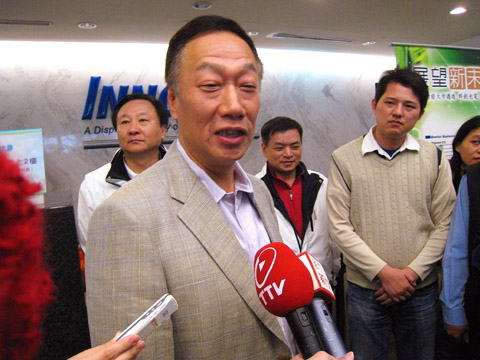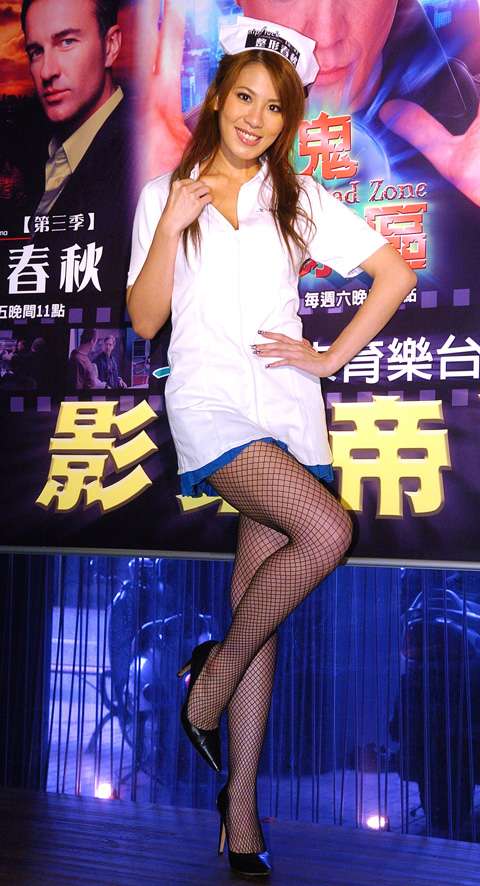Though bouffant-styled entertainer Zhang Fei (張菲) might be able to teach Taiwan’s “home boys” (zhainan, 宅男) a thing or two about picking up members of the opposite sex, he isn’t the man to turn to for lessons in etiquette.
The “eager old fellow” (色老頭), known for his penchant for sweet young thangs, lived up to his reputation this week when he was caught in a fast food restaurant allegedly trying to pick up some hot young lasses by taking photos together and asking for their contact information, according to a report in the Liberty Times (the Taipei Times’ sister newspaper).
Tame stuff, you may think, but what had Netizens in a tizzy was Zhang’s apparent disregard for pedestrians; he had parked his huge road bike in front of the store’s entrance, effectively blocking the way.

PHOTO: TAIPEI TIMES
“I was only in there for eight minutes,” he said, when questioned by the press.
The flagrant flouting of social convention didn’t stop there. The variety show host and one-liner king was said to have carelessly flicked a cigarette butt on the ground and left a pile of garbage on the table rather than throwing it in the trash can.
“Look, I didn’t put the garbage in the trash because I didn’t know it was something I was supposed to do,” he said.

PHOTO: TAIPEI TIMES
Bikes, butts and trash, a far cry from sex, drugs and rock ’n’ roll, but nevertheless a trifecta that goes a long way to explaining Fei’s increasingly bad reputation in the vernacular media.
In other “Godfather of television” (大哥大) news, it seems that entertainer Hu Gua (胡瓜) just can’t get a break. Next (壹週刊) magazine reported on Wednesday that Li Jin-liang (李進良), a plastic surgeon and husband to the variety show host’s daughter, was allegedly caught entertaining two friends and three hostesses in separate rooms at a Taipei hotel.
In typical Next fashion, photographs were published showing a chronology of the plot as it unfolded: The arrival of the three young studs at the hostess bar (8pm); driving with the mama-san (媽媽桑) through the streets of Taipei to pick up three females (12:28am); the three men and three women entering a hotel (12:50am); and exiting the hotel (1:48am).
The denouement, however, was Hu Ying-zhen (胡盈禎) driving her husband home at 2:45am.
When asked by members of the press pack what her husband was doing with the hostesses, Hu Ying-zhen coined what could be a new euphemism: “My husband was just engaged in social activities.”
For Li, though, this is old hat. Loyal readers of Pop Stop will recall that while the couple were betrothed, Li was accused by porn star Hinano Miduki (觀月雛乃) of sexually abusing her for two years — this along with a whole string of rumor and innuendo of Li’s sexual escapades.
On a more romantic note, Terry Gou (郭台銘) might have finally found love.
The Hon Hai Precision Industry Co (鴻海精密) chairman — considered by some to be Taiwan’s most eligible bachelor because of his large bank balance and debonair deportment — has previously been linked with actress Carina Lau (劉嘉玲) and model Lin Chi-ling (林志玲). The lucky woman this time is a dancer named Delia Tseng (曾馨瑩).
“I don’t get the whiff of money from her,” (我在她身上聞不到錢的味道), Gou said, meaning that she’s not dating him for his thick wads of cash.
It’s nice to see that love isn’t dead.

In the March 9 edition of the Taipei Times a piece by Ninon Godefroy ran with the headine “The quiet, gentle rhythm of Taiwan.” It started with the line “Taiwan is a small, humble place. There is no Eiffel Tower, no pyramids — no singular attraction that draws the world’s attention.” I laughed out loud at that. This was out of no disrespect for the author or the piece, which made some interesting analogies and good points about how both Din Tai Fung’s and Taiwan Semiconductor Manufacturing Co’s (TSMC, 台積電) meticulous attention to detail and quality are not quite up to

April 21 to April 27 Hsieh Er’s (謝娥) political fortunes were rising fast after she got out of jail and joined the Chinese Nationalist Party (KMT) in December 1945. Not only did she hold key positions in various committees, she was elected the only woman on the Taipei City Council and headed to Nanjing in 1946 as the sole Taiwanese female representative to the National Constituent Assembly. With the support of first lady Soong May-ling (宋美齡), she started the Taipei Women’s Association and Taiwan Provincial Women’s Association, where she

Chinese Nationalist Party (KMT) Chairman Eric Chu (朱立倫) hatched a bold plan to charge forward and seize the initiative when he held a protest in front of the Taipei City Prosecutors’ Office. Though risky, because illegal, its success would help tackle at least six problems facing both himself and the KMT. What he did not see coming was Taipei Mayor Chiang Wan-an (將萬安) tripping him up out of the gate. In spite of Chu being the most consequential and successful KMT chairman since the early 2010s — arguably saving the party from financial ruin and restoring its electoral viability —

It is one of the more remarkable facts of Taiwan history that it was never occupied or claimed by any of the numerous kingdoms of southern China — Han or otherwise — that lay just across the water from it. None of their brilliant ministers ever discovered that Taiwan was a “core interest” of the state whose annexation was “inevitable.” As Paul Kua notes in an excellent monograph laying out how the Portuguese gave Taiwan the name “Formosa,” the first Europeans to express an interest in occupying Taiwan were the Spanish. Tonio Andrade in his seminal work, How Taiwan Became Chinese,